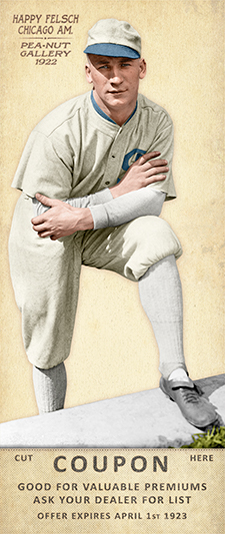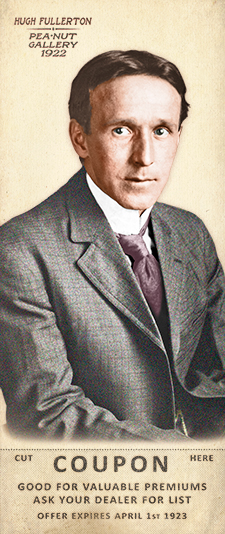
- Series: 1919 Black Sox Scandal
- City: Chicago
- Team: White Sox
- League: American League
Oscar Emil Felsch (1891-1964) was a sunny-tempered soul, the epitome of the hail-fellow-well-met. Born into the German community of Milwaukee, Felsch excelled at baseball and went on to become the star center fielder for the Chicago White Sox for six seasons spanning the most tumultuous era in franchise and baseball history. Charles Comiskey brought Hap to the Windy City in 1915 as part of one of the most successful rebuilding efforts in the game’s history. Felsch joined future Hall of Famer Eddie Collins and the incomparable “Shoeless” Joe Jackson, forming a club that would become a dominant force in the American League through the WWI years. Indeed, he forged the kind of career that Jim Nitz of SABR states might have been remembered “as one of the best all-around center fielders in baseball history.” He led his hard-hitting team in home runs and slugging, he was a league-leader in both offensive and defensive stats. And everybody loved Hap.
Years after the sordid story of the Black Sox had waned, Felsch, amiable as ever, was virtually the sole source for writer Eliot Asinof’s Eight Men Out. Hap was as humble as he was forthright in recounting his role in the scandal that shook baseball and ushered in the Judge Landis autocracy that forever changed the structure of the game. “I shoulda knew better,” moaned the aged and infirm former slugger. Earlier he had testified to foreknowledge and acquiescence to the gamblers’ schemes, but always denied actively trying to lose a game, much less the Series.
Despite his reputation for a very sociable demeanor, Felsch suffered under the indignities inflicted by miserly Comiskey. Injuries, his brother’s war wounds, his father’s illness, all took a toll as well in 1919, as did the clubhouse friction between players riven by the war effort. Felsch, Jackson and others had taken defense-industry jobs in ‘18 while others had enlisted. Rivalries erupted and friendships were damaged. Into the tensions stepped unctuous underworld minions of east coast mobsters. The resulting scandal enmeshed Felsch and he never pretended innocence.
- After being ousted from organized ball by Landis, Felsch endured years of litigation mingled with varying efforts to play ball. Eventually he went north and enjoyed success in Canadian circuits while always maintaining the love and support of his hometown

- Series: 1919 Black Sox Scandal
- Hall: J.G. Taylor Spink Award Recipient
Hugh Stuart Fullerton III (1873-1945) was one of the most respected sports journalists of the early twentieth century, introducing colloquial language and a human interest slant to the field. He was a mentor to at least two other all-time great sports scribes: Ring Lardner and Grantland Rice. He established his keen analysis of baseball stats early on when he projected one of the greatest World Series upsets, calling the 1906 tourney for the woeful-hitting White Sox over the 116-game winning Cubs in a crosstown rivalry for the ages. Yet, it wasn’t Fullerton’s on-field acumen that indelibly stamped his legacy on the game. The character-trait that shone most clearly was his integrity and zeal for the honor of the national pastime when, in 1919, Hugh refused to do what most in and outside the game did that year: duck and cover.
In blowing the whistle on what came to be known as the Black Sox scandal, Fullerton, aided by his ally Christy Mathewson, used his articles in the Chicago Herald-Examiner as a claxon, forcing the nation to face the existential threat posed by the vast network of underworld gamblers preying on players and the game itself. It took a year before his and Matty’s efforts bore fruit but, eventually, despite a widespread conspiracy of silence, charges were filed and eleven players were banned from baseball for life. No one was ever convicted of a crime, largely due to evidence that vanished quicker than a magician’s coin. Hugh was credited with shining the purifying light of investigative journalism at its finest on the threat. Baseball historian David Q. Voigt said, “In 1919 it was Fullerton’s detective work that unraveled the web of fact and rumor and exposed the crooked work of the Black Sox.” In a 1932 retrospective, Westbrook Pegler commented on the uniqueness of Fullerton’s contribution: “The fake world series of 1919 produced some of the worst newspaper reporting that the American press ever has been guilty of, and while all of us who were detailed to cover the show were not fired for missing the greatest sport story in 20 years is something that I have never understood. We were terrible.”
- Mathewson had covered the Series for a New York paper. He became Fullerton’s “expert witness,” parsing each key play for signs of wrongdoing
- Fullerton was a founder of the Baseball Writers Association of America. He is credited as the first of his field to include direct quotes of players in his coverage of the sport
- Elected to the Hall of Fame for Sportswriters via his selection for the J.G. Taylor Spink Award in 1946

